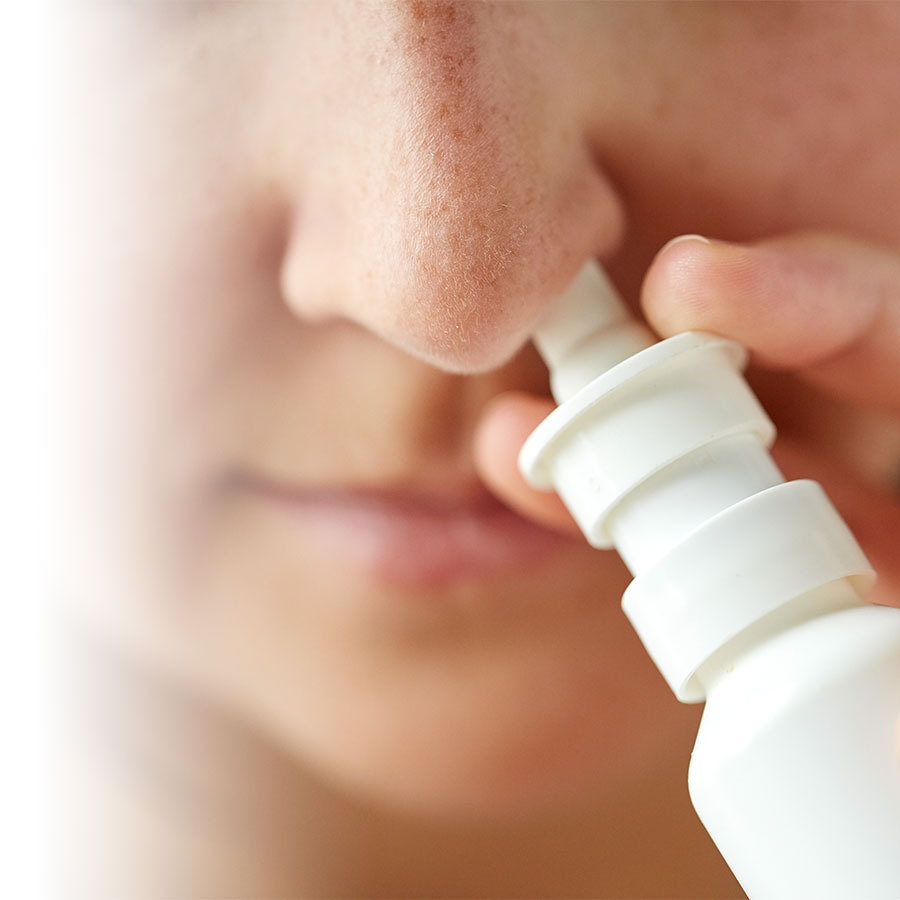To keep your nose and airways healthy, certain habits can make all the difference. Find out what they are.
Health—nothing to thumb your nose at
The nose has many very important functions. It warms, humidifies and purifies the air we breathe. Its mucous membrane protects airways against external threats by filtering particles present in the air. The nose helps project the sound our voice and, of course, is responsible for our sense of smell.
The mucous membrane intercepts external threats with its mucus, which blends with impurities. Then, the small nose hairs on the mucous membrane direct these impurities toward the throat and stomach. Stomach acids permanently eliminate them. Sneezing is another way of getting rid of impurities. Proper nasal hygiene helps the mucous membrane protect the body.
Nasal hygiene and infections
Millions of Canadians are affected by colds each year. On average, adults will suffer from one to two colds each year. Children will have an average of six to eight colds a year. There is no cure for the common cold, only ways of reducing symptoms (runny nose, cough, nasal congestion, etc.).
The use of saline water is a safe and effective way to relieve cold symptoms or sinusitis, as clearing nasal passages diminishes nasal congestion. This is all the more important for children, as they are unable to effectively blow their noses.
Nasal hygiene and allergies
The nose is in constant contact with allergens (dust mites, pollen, and mould). Some people develop allergic reactions accompanied by nasal congestion and sneezing. In addition to reducing symptoms, the use of saline water eliminates allergens found in the mucous membrane.
Clean up your environment
Preserving respiratory health begins with a healthy environment. Here are a few tips to reduce the number of threats in your environment:
- avoid carpets as much as possible
- don't let dust accumulate in your home
- clean your house regularly
- maintain proper humidity levels in your home, and
- avoid smoking or inhaling second-hand smoke
Nasal hygiene in babies and young children
Just as for adults, it is not required to clean your child’s or your baby’s nose. However, it can be useful if their nose is stuffy and they find it difficult to suckle or sleep. Saline solutions can help to clear a stuffy nose. It is possible to use a commercial solution or simply to a make a homemade preparation. Steam from a bath or shower can also be effective to clear a child’s stuffy nose. If needed, a nasal aspirator can be used. Speak to your pharmacist before purchasing this type of device and inquire about the right technique to use.
The pharmacist can also help you make the appropriate choice and tell you how to use a saline solution. There are several products available on the market in various formats: dropper, single-dose ampoules, sprays and nasal rinses. The choice of product depends on age, needs and personal preferences.
There are water-based formulations called “isotonic” or “hypertonic”. Isotonic products contain the same concentration of salt as body fluids, while hypertonic solutions contain a higher concentration of salt. There are also sprays with a gentle to full stream, and certain products include eucalyptus.
To avoid the risks of contamination between family members, it is preferable that each person have their own bottle of saline solution. Remember to clean the dropper or nozzle that comes into contact with the nose to reduce the risk of contamination.
In short, it can be difficult to navigate through the wide range of products, but your pharmacist is there to help you make the choice best suited to your needs.
How do you teach a child to blow their nose?
Place a cotton ball on a flat surface. Ask the child to block one nostril. Then, ask them to blow through the second nostril while keeping their mouth closed. Check to see if the cotton ball moves! Once they have succeeded with one nostril, repeat the exercise using the other.
With the wide range of saline solutions available on the market, you shouldn’t hesitate to ask the advice of your pharmacist, who will help you make the best choice for each family member. Use this opportunity to review the irrigation technique with them!


